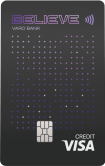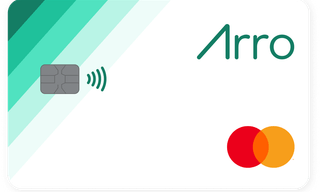Can’t Get a Credit Card? Try These Alternative Options
When you can't get a credit card, consider less traditional credit card options that build credit.

Many or all of the products on this page are from partners who compensate us when you click to or take an action on their website, but this does not influence our evaluations or ratings. Our opinions are our own.
Getting a credit card without a credit history can present many obstacles if you can’t meet the requirements imposed by the traditional FICO scoring model. Secured credit cards are sometimes an option, but they require an upfront deposit, which can be cost-prohibitive.
Alternative credit card issuers are trying to bridge this gap by using their own nontraditional underwriting standards to assess creditworthiness based on factors such as income, employment and bank account information. Some of these products function like traditional credit cards, while others are more akin to charge cards.
But the point is that even if you have bad credit, limited credit or no credit at all, you have options — and some may be easier to get than you think.
Consider these alternative credit cards.
While any credit card can adjust its rewards, benefits and fee structure at any time, new cards from startup financial technology companies are particularly prone to significant changes as they find their place in the market. Keep that in mind as you peruse this list.
» MORE: How to build credit fast
Best alternative credit cards
Best for no credit
Tilt Motion
The $0-annual-fee Tilt Motion card is an option for credit beginners and second-chance seekers. The card's issuer, WebBank, can opt to use a nontraditional underwriting process that doesn't rely solely on credit scores and can instead consider factors like your income. It also eliminates other obstacles to credit, as it doesn’t require a security deposit or excessive fees. Your payments are reported to all three major credit bureaus: TransUnion, Equifax and Experian. These companies record the information used to calculate your credit scores, and a history of on-time payments can have a positive impact on them. Tilt also offers several ways to increase your credit limit. For starters, you can get an automatic increase when you link a bank account. You're also evaluated for a higher credit limit in as little as four months and again at six months if you’ve made six consecutive on-time payments. Beyond those options, Tilt reviews your account to see whether you're eligible for more increases over time, as is standard with most credit cards. On top of all that, it offers modest rewards with specific merchants.
The Tilt Motion is a sibling of the Tilt Essentials and Tilt Engage cards. When you go through Tilt's prequalification process, you’re considered for all three of them and provided with the best match, if any. If you aren't eligible for the Tilt Motion because you lack sufficient cash flow or credit, you might qualify for the $59-annual-fee Tilt Engage card instead. With fair credit or better, you might be eligible for the Tilt Essentials card (see below). Tilt may require you to link a bank account through a third party. You must be a U.S. resident with a valid Social Security number or an Individual Taxpayer Identification Number (ITIN) to qualify for a Tilt card.
» MORE: What is WebBank?
Best for fair or limited credit
Tilt Essentials
The $0-annual-fee Tilt Essentials card is ideal for those with fair credit. It doesn’t require a security deposit and features the same credit-building features as the Tilt Motion and Tilt Engage cards. Unlike those other cards, though, it offers richer rewards, similar to those offered by traditional credit cards for those with stellar credit. You’ll get 3% cash back on gas and groceries when you set up automatic payments, and 1% on all other purchases. It doesn't, however, offer the introductory incentives for new cardholders often found on traditional credit cards for good credit and above. And again, Tilt's prequalification process determines which Tilt card you're actually eligible for (if any).
Mission Lane Green Line Visa
The Mission Lane Green Line Visa is meant for those with fair to good credit, but your eligibility may not hinge entirely on your credit scores. Mission Lane and its issuers can evaluate your application via proprietary underwriting models, taking into consideration things like your income and bank account history.
The card also has a pre-qualification process that allows you to understand your odds of approval without any initial impact on your credit scores. (It’s not until you officially accept the offer and terms that your credit scores can temporarily take a hit, but this is typical in the application process for most credit cards.)
The card doesn't require a security deposit, but it might have an annual fee, which can range from $0 to $59 and is determined based on your credit profile. It doesn't earn rewards, but it could offer the opportunity to upgrade to a higher-tier Mission Lane credit card as your credit scores improve.
Best for poor credit
Grow Credit Mastercard
The Grow Credit Mastercard is ideal for those with no credit or poor credit (FICO scores of 629 or below). It's a virtual card that allows you to build credit while paying for qualifying monthly subscriptions that include eligible bills, TV, music and other streaming services. It's one of a handful of decent credit cards that don’t require a credit check. Instead, the company has its own proprietary technology that looks at income to evaluate creditworthiness. To weigh that information, Grow Credit requires that you link a bank account.
You can choose from different membership plans, depending on eligibility. Each one has a different price point, a different monthly spending limit, and different subscriptions that are covered. For instance, the Build membership plan allows you to build credit with subscriptions like Netflix, Pandora, Spotify and others. The paid membership plans include "premium" subscriptions, allowing you to build credit with Verizon Wireless, AT&T, Sprint or T-Mobile payments, among others.
The Grow Credit Mastercard functions like a credit card in some ways, but you're not free to spend on any purchase. You can charge only those specific subscription transactions. The line of credit itself is small, but payments are reported to all three major credit bureaus.
The card doesn't allow you to carry a balance from month to month either, and as a result it doesn't charge interest or fees (beyond what you might owe for one of the paid membership plans).
Chime Card™
The Chime Card™ offers some of the buffers you may need when you’re getting a first or second chance at building credit. And while technically it's a secured card, it lacks some of the obstacles that come with many products in that class.
For instance, you don’t have to undergo a hard credit check or pay a minimum security deposit upfront. Chime® can look at income to determine whether you’re eligible for the card.
You'll need a Chime Checking Account, and the money you move from that account to the Credit Builder secured account determines the amount you can spend with the card. That money can also be used to pay off your balance. When you make a payment, it’s reported to all three major credit bureaus.
Also unlike many other secured credit cards, this card doesn’t allow you to carry a balance from one month to another, and it doesn’t charge interest, annual fees or late fees.
On July 6, 2021, the nonprofit news organization ProPublica reported that Chime customers had their accounts closed without notice, leaving them without access to funds. In ProPublica’s report, Chime said many account closures were linked to fraud, but it also admitted that several of the closures had been mistakes. If your account is closed by Chime or other neobanks without notice, there are some steps you can take to potentially remedy the situation. Act quickly by contacting the neobank to explain the situation. And, if you aren't helped by the neobank, you may file a complaint with the Consumer Financial Protection Bureau.
Varo Believe Secured Credit Card

Image courtesy of Varo
The Varo Believe Secured Credit Card requires a security deposit, but you get to choose the amount. That kind of flexibility makes it possible to build credit without straying from your budget. It does report to all three major credit bureaus, but doesn't work exactly like a traditional credit card. For instance, it doesn’t charge interest or fees since you can't carry a balance. And there's no hard credit check when you apply.
To qualify, you need a Varo bank account that has received direct deposits of at least $200 in the past 31 days. You can only spend as much as you deposit in the secured account, so you can't rack up debt.
Cardholders will also have a chance to snag incentives through Varo’s online offers when they shop with select retailers.
Current Build Card
The Current Build Card, issued by Cross River Bank, doesn’t charge interest since you can’t use it to carry a balance from one month to the next. With this option, you won't have to worry about overspending or debt. You’ll also get to skip the credit check as part of the application process, and there’s no upfront security deposit required to qualify. You will need to open a Current Account to be eligible for the card. It’s where you’ll deposit the amount of money you’ll have available to spend with the card.
Your payments are reported to all three major credit bureaus, so you’ll establish credit on all fronts. As you build credit, you’ll also have the ability to earn rewards. Plus, the card earns modest rewards.
» MORE: What is Cross River Bank?

Image courtesy of Arro
Arro Card
The Arro Card, issued by Community Federal Savings Bank, doesn’t require an upfront security deposit or credit check. As with other cards on this list, it uses data like income and bank account information to determine eligibility.
It does require an annual Arro membership of $60 — though that might be discounted the first year depending on your starting credit line. That's a relatively low cost compared with other credit card options for those with less-than-ideal credit.
To qualify for this card, a bank account is required, and you have to link the account to have your income verified. The Arro Card reports payments to all three major credit bureaus, allowing you to establish a credit history.
Best for no Social Security number or ITIN
Zolve Classic Credit Card
The Zolve Classic Credit Card allows you to qualify without a Social Security number, as long as you have alternative documentation such as an I-20 if you’re a student, or offer letters or pay slips for workers. The card also reports to the three major credit bureaus.
The card is affordable and highly accessible: The annual fee is $0, so there's no cost to keeping it around long term. And there's no security deposit or credit history requirement either.
You'll also earn rewards — 1% back on purchases, which is modest overall but decent for cards in this class.
Currently, however, there's no clearly defined upgrade path to a better card from Zolve when you're ready.
Find the right credit card for you.
Whether you want to pay less interest or earn more rewards, the right card's out there. Just answer a few questions and we'll narrow the search for you.





